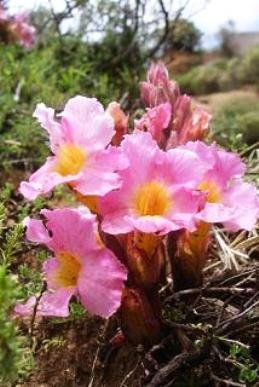Harveya huttonii

Author: Ivan Lätti
Photographer: Judd Kirkel Welwitch
Harveya huttonii, previously known as H. pulchra among other names, is a fleshy, parasitic herb that reaches heights around 50 cm.
Funnel-shaped pink or lilac flowers with white or pale-yellow, constricted throats appear in short, loose racemes from before midsummer to early autumn.
The plant occurs in the eastern parts of South Africa, in the Eastern Cape, the Free State, KwaZulu-Natal and Mpumalanga.
The habitat is grassland and damp scrub at higher altitudes. The habitat population is deemed of least concern early in the twenty first century.
The Harveya genus of parasitic plants that form part of the Orobanchaceae family includes several species with spectacular flowers.
Parasitic plants can influence the evolution of their host species. This happens when the hosts develop resistance mechanisms to the invaders and the parasites adapt to overcome the obstacles. This is a sort of ongoing arms race that governs the dynamic nature of ecosystems.
Ukraine resists via new arms and alliances. Leaders worldwide keep searching for bigger, more durable solutions. All at higher levels, for we have brains after all. Heraclitus saw the vibrancy in conflict, looking upon peace as a period of stagnation between two periods of development. Another few thousand years and humanity may really be ready for peace (Manning, 2009; Pooley, 1998; Visser, 1981; iNaturalist; http://redlist.sanbi.org).

